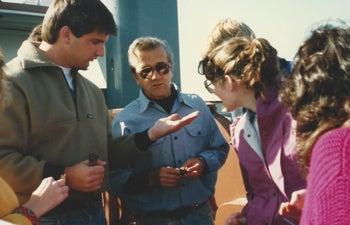In Memoriam: Basil Nafpaktitis, 85
Basil (Vasilis) George Nafpaktitis, Emeritus Professor of Biological Sciences at USC Dornsife and at the University of Crete, has died. He was 85.
Nafpaktitis died on May 24 in Charlottesville, Virginia, from complications associated with Parkinson’s disease. He was surrounded by his loving family and his wife of more than 50 years.
Within his profession Nafpaktitis was best known for his work on the taxonomy, distribution, ecology and functional morphology of lanternfishes (family Myctophidae) and for his studies of bioluminescence in deep sea fish. In addition to his research, he supervised the doctoral work of more than 20 graduate students, and his teaching was recognized with the USC Biology Students Association Award for Outstanding Teaching in 1971 and the USC Associates Award for Excellence in Teaching two years later.
“Toward his research and teaching, Basil had an unabashed and infectious enthusiasm,” said departmental colleague Albert Herrera, professor of biological sciences. “He could make you care more about comparative vertebrate anatomy than you ever thought you would. I’m sure that this superior ability to communicate his knowledge and interest is what made him an award-winning teacher.”
In 1982, Nafpaktitis was invited to take up a joint appointment to the faculty of the University of Crete in Greece to serve as a founding member of the biological sciences department. After spending a year at that university, during which time he also helped to found the Institute of Marine Biology of Crete, he returned annually to teach graduate courses until his retirement in 1998.
Professor of Biological Sciences Bob Baker characterized Nafpaktitis as a kind, bright, superbly enthusiastic person who was also a good friend.
“Basil was an intellectual who used his vast scientific knowledge to elucidate the intricacies of evolution of organisms in the marine world,” Baker said “In conversation he pulled us along in our attempts to understand the embryological development of terrestrial life as well as the origins of his favorite marine organisms.
“Students at all levels adored Basil. He was helpful in their personal lives and in mentoring them in the life sciences. He wanted everyone to know why we all need to understand more about ourselves and where we came from. I miss him very much. He epitomized an ideal that is rare.”

Basil Nafpaktitis was known for his “superb enthusiasm” for the subject matter he taught. He is pictured here with students in 1986. Photo courtesy of Mary Nafpaktitis.
Nafpaktitis was born in Athens, Greece. His father ensured that Basil and his older brother, Nicholas, were tutored in English from an early age, and they learned to speak Russian from his Ukrainian-born mother and grandmother, who lived with the family. His father died just before the beginning of World War II, leaving his wife and young sons to survive the hardships of the Nazi occupation of Athens on their own.
Nafpaktitis went on to earn his bachelor’s degree in 1962 and his master’s the following year at the American University of Beirut, and it was in Lebanon that he met Mary, his future wife. He earned his Ph.D. in biology at Harvard University in 1966 and was immediately employed by the USC Dornsife Department of Biological Sciences and the Allan Hancock Foundation. He became a U.S. citizen in 1971.
Nafpaktitis mentored not only his students, but also staff colleagues such as Chris Yokas, a business officer for several of the natural science departments at USC Dornsife.
“Basil was a wonderful person and we shared many conversations together about our heritage and faith. His talents with roses were absolutely astonishing. He was a great role model for me in my early career here at USC.”
Retiring with his wife to San Miguel, California, Nafpaktitis became involved in the local Greek-American community. He helped to build their first church in San Luis Obispo, California, Saint Andrew the Apostle Greek Orthodox Church.
Nafpaktitis will be remembered for his scholarship, his mentorship and his teaching, but perhaps even more for his passion for life and learning, his almost poetic use of language (whether Greek or English) to recount vivid stories, his warm and genuine interest in others, his deep connection to the ocean and to the land, and for being a loving husband and father. He is survived by his wife, children and grandchildren.
“We will remember him always as the most loving and inspiring husband, father and grandfather, and for his passion for life and learning,” said his daughter, Margarita Nafpaktitis. “He taught us how to pick a thing up with both hands, look at it with the keenest and most curious eye, and put our nose right up to it and take a deep breath. Our life was so much richer for his being in it.”
Donations in Nafpaktitis’ memory can be made to Piedmont CASA via their website at www.pcasa.org/donate.php.
Friends and loved ones are invited to sign his guestbook at sanluisobispo.com/obituaries.